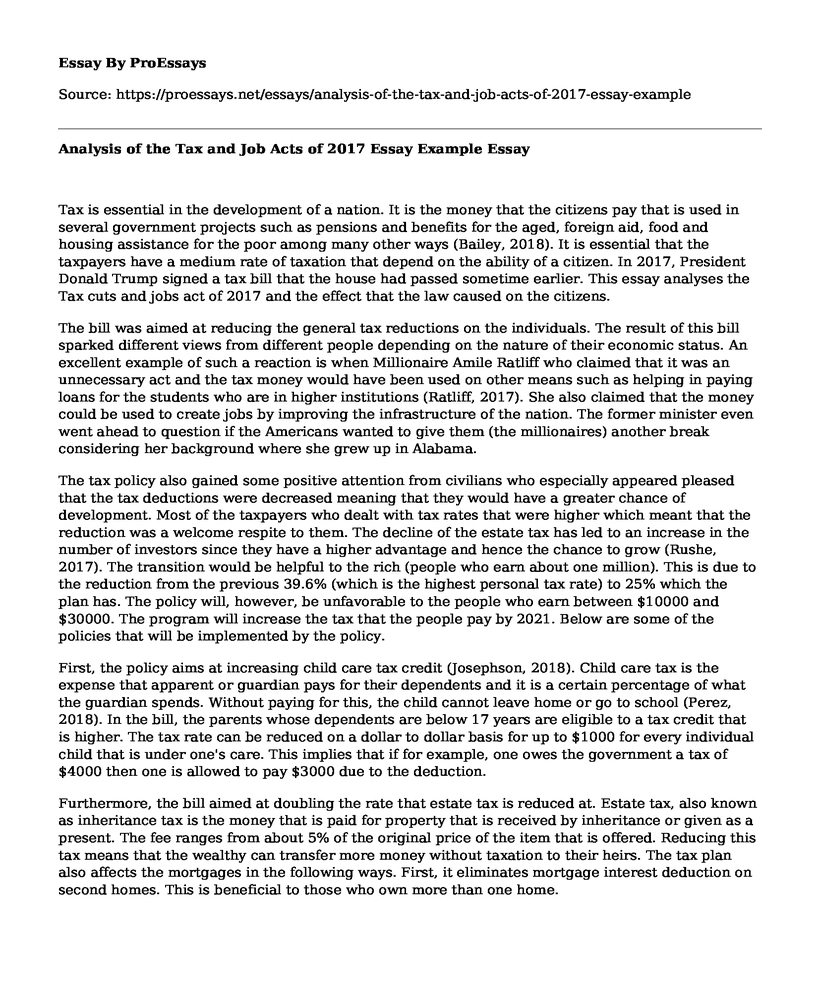Tax is essential in the development of a nation. It is the money that the citizens pay that is used in several government projects such as pensions and benefits for the aged, foreign aid, food and housing assistance for the poor among many other ways (Bailey, 2018). It is essential that the taxpayers have a medium rate of taxation that depend on the ability of a citizen. In 2017, President Donald Trump signed a tax bill that the house had passed sometime earlier. This essay analyses the Tax cuts and jobs act of 2017 and the effect that the law caused on the citizens.
The bill was aimed at reducing the general tax reductions on the individuals. The result of this bill sparked different views from different people depending on the nature of their economic status. An excellent example of such a reaction is when Millionaire Amile Ratliff who claimed that it was an unnecessary act and the tax money would have been used on other means such as helping in paying loans for the students who are in higher institutions (Ratliff, 2017). She also claimed that the money could be used to create jobs by improving the infrastructure of the nation. The former minister even went ahead to question if the Americans wanted to give them (the millionaires) another break considering her background where she grew up in Alabama.
The tax policy also gained some positive attention from civilians who especially appeared pleased that the tax deductions were decreased meaning that they would have a greater chance of development. Most of the taxpayers who dealt with tax rates that were higher which meant that the reduction was a welcome respite to them. The decline of the estate tax has led to an increase in the number of investors since they have a higher advantage and hence the chance to grow (Rushe, 2017). The transition would be helpful to the rich (people who earn about one million). This is due to the reduction from the previous 39.6% (which is the highest personal tax rate) to 25% which the plan has. The policy will, however, be unfavorable to the people who earn between $10000 and $30000. The program will increase the tax that the people pay by 2021. Below are some of the policies that will be implemented by the policy.
First, the policy aims at increasing child care tax credit (Josephson, 2018). Child care tax is the expense that apparent or guardian pays for their dependents and it is a certain percentage of what the guardian spends. Without paying for this, the child cannot leave home or go to school (Perez, 2018). In the bill, the parents whose dependents are below 17 years are eligible to a tax credit that is higher. The tax rate can be reduced on a dollar to dollar basis for up to $1000 for every individual child that is under one's care. This implies that if for example, one owes the government a tax of $4000 then one is allowed to pay $3000 due to the deduction.
Furthermore, the bill aimed at doubling the rate that estate tax is reduced at. Estate tax, also known as inheritance tax is the money that is paid for property that is received by inheritance or given as a present. The fee ranges from about 5% of the original price of the item that is offered. Reducing this tax means that the wealthy can transfer more money without taxation to their heirs. The tax plan also affects the mortgages in the following ways. First, it eliminates mortgage interest deduction on second homes. This is beneficial to those who own more than one home.
Conclusion
The tax bill that was passed by Trump was aimed at reducing the tax rates that the citizens pay on average by lowering the rates that were charged per type of tax. It is essential to have a tax plan that does not undermine a group of people. The policy has gained both positive and negative criticism. The millionaires, for example, do not approve the deduction of inheritance tax and term it as an unnecessary act since they can afford it. On the positive side, investors in mortgages, for example, have expressed the joy of having their tax reduced.
References
Bailey, K. (2018). How Are Your Tax Dollars Used by the Federal Government? - dummies. Retrieved from https://www.dummies.com/personal-finance/personal-finance-taxes/how-are-your-tax-dollars-used-by-the-federal-government/
Josephson, A. (2018). Trump Tax Plan: Details and How It Affects You - SmartAsset. Retrieved from https://smartasset.com/taxes/heres-how-the-trump-tax-plan-could-affect-you
Perez, W. (2018). Get a Federal Tax Credit for the Cost of Child and Dependent Care. Retrieved from https://www.thebalance.com/child-and-dependent-care-tax-credit-3193008
Ratliff, A. (2017). I'm a millionaire. I don't need another tax break, Mr Trump | Amelie Ratliff. Retrieved from https://www.theguardian.com/commentisfree/2017/sep/28/millionaire-estate-tax-break-congress
Rushe, D. (2017). Who wins and loses in Trump's tax plan?. Retrieved from https://www.theguardian.com/us-news/2017/nov/18/trump-tax-plan-winners-and-losers
Cite this page
Analysis of the Tax and Job Acts of 2017 Essay Example. (2022, Oct 08). Retrieved from https://proessays.net/essays/analysis-of-the-tax-and-job-acts-of-2017-essay-example
If you are the original author of this essay and no longer wish to have it published on the ProEssays website, please click below to request its removal:
- Amazon Audit Report
- Accounting Problem Faced by Linbarger Company Paper Example
- Essay Sample on The Process of Voir Dire
- Essay Sample on The Trump Presidency
- Comparative Analysis of Human Rights Protection Paper Example
- Critical Essay on Sandor Marai's Embers
- Essay Example on Freedom, Leadership & Democracy: Exploring the Intimate Connection







